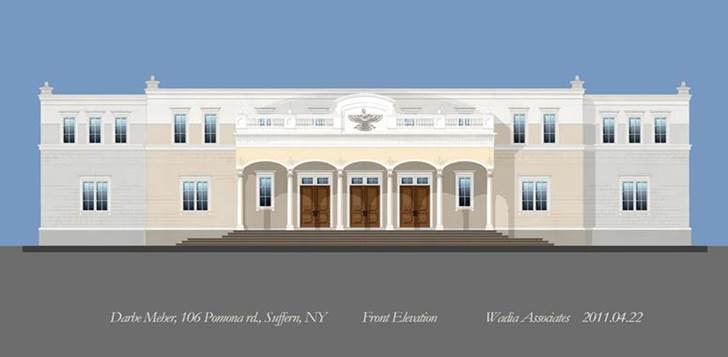The Zoroastrian Temple of Greater New York will soon open
 The gloomy and rainy Sunday forecast fortuitously did not come to pass on a sunny fall day when well over 300 supporters cheerfully congregated under the tent on the front grand parklike grounds of the new Dar-e-Mehr Temple in New York. The air reverberated with the singing of the The Star Spangled Banner accompanied by violin played by the 7 year old Cyrus, children’s poetry readings, and folk singing and dancing. Adults hustled & bustled catching up on the latest amidst the aromas of Biryani saffron rice, Darjeeling tea and other delicacies. The state of the art grand Dar-e-Mehr Zoroastrian Temple, the DMZT, located in Suffern New York, a few minutes’ drive west of the Tappan Zee Bridge, is only one last step away from its completion. Although the acquisition of the Certificate of Occupancy by December 2015 remains on target, the official festive inauguration is scheduled for March 2016 in conjunction with Nowruz annual parties. In addition to the main sacred temple, the new DMZT has a dozen classrooms, a library, several small meeting rooms, a spacious kitchen and a grand 400 capacity banquet hall. The grand hall is anticipated to be made available to the broader community for weddings, gala, banquets, and special events.
The gloomy and rainy Sunday forecast fortuitously did not come to pass on a sunny fall day when well over 300 supporters cheerfully congregated under the tent on the front grand parklike grounds of the new Dar-e-Mehr Temple in New York. The air reverberated with the singing of the The Star Spangled Banner accompanied by violin played by the 7 year old Cyrus, children’s poetry readings, and folk singing and dancing. Adults hustled & bustled catching up on the latest amidst the aromas of Biryani saffron rice, Darjeeling tea and other delicacies. The state of the art grand Dar-e-Mehr Zoroastrian Temple, the DMZT, located in Suffern New York, a few minutes’ drive west of the Tappan Zee Bridge, is only one last step away from its completion. Although the acquisition of the Certificate of Occupancy by December 2015 remains on target, the official festive inauguration is scheduled for March 2016 in conjunction with Nowruz annual parties. In addition to the main sacred temple, the new DMZT has a dozen classrooms, a library, several small meeting rooms, a spacious kitchen and a grand 400 capacity banquet hall. The grand hall is anticipated to be made available to the broader community for weddings, gala, banquets, and special events.
DMZT aka Atashkadeh Arbab Rostam Guive, conceived in 1977, was initially located in New Rochelle for over two decades. It was then moved to this newly acquired multimillion dollar property in Suffern, New York over ten years ago. The outdated cylindrical building was soon found to be inadequate, minimally functional, and in need of constant costly service calls. This soon led to the visionary conceptualization of the new temple, whose exterior facade is nostalgically inspired by the ancient Atashkadeh in Yazd, Iran. The concept was finally put to reality after the community pulled resources to raise nearly five million dollars, including more than half a million dollars this past Sunday. In particular, the noble Parsi (ZAGNY) communities of Mumba India and Pakistan, as well as Iranians (IZA) currently residing in the area played a crucial role toward the construction of the new Temple. For instance, Mr. and Mrs. Feroze and Shahnaz Bhandara were the most generous benefactors of this past Sunday with their contribution of $300,000. The couple have throughout their lives contributed immeasurably toward many similar projects including the construction of the major Atashkadeh in Houston, the first of its kind outside India, Iran, and Pakistan where ten Mobads (priests-in- training) st the time can study and reside.
The population of Zoroastrians worldwide currently stands at up to 150,000. But the broader population in southwest Asia, especially those in Iran, Afghanistan, Tajikistan, central Asia, the Caucuses, the Kurds and Izadis of norther Iraq and eastern Turkey, as well as clusters along the southern shores of the Persian Gulf, collectively estimated to be over several hundred million, continue to proudly observe many of the Zoroastrian festivals (Nowruz, Navjod, Tirgan, Mehregan, Yalda, Sadeh) and the three Zoroastrian tenets: Good Deeds, Good Thoughts, & Good Words. In fact, one could surmise the ubiquitous pillars of life, i.e., spiritual humanism and mysticism, volunteerism, altruism and philanthropy, as encapsulated in a 13th century Persian poem by Sa’adi, must have been inspired deeply from the three Zoroastrian tenets:
Humans are all members of one frame,
Since all, at first, from the same essence came;
When by hard fortune one limb is oppressed,
The other members lose their desired rest;
If thou feel’st not for others’ misery,
A human being is no name for thee!
(Hi-)Story has it that when the first group of Persian Zoroastrians migrated from Iran to Gujarat and Sindh of India, circa 8-10th century, the local king welcomed them with trepidation by sending them a large bowl over-filled to the rim with wholesome milk. The king was indirectly conveying his hospitality while alluding that the local shores were already overpopulated and resources scarce. The newly arrived Parsis drank a portion of the milk and re-filled it back up to the rim with the local Persian honey they had brought with them from the motherland. The Parsis were in essence pledging that they would sweeten, i.e., contribute immensely to the advancement of the new community. They have upheld this pledge not only in India, but wherever they have emigrated to ever since.
It is in that spirit that you are urged, as you relate to the three Zoroastrian tenets and the DMZT, to seriously consider becoming associated members and to contribute toward the construction and beatification funds. At the very least, your family membership is your natural action NOW. You may send your contributions to: Minu Dutia, DMZT-Treasurer, 1 Broadview Drive, Medford, NJ 08055.





